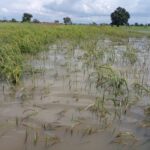Dr Rose Gidado is a director, Agricultural Biotechnology Department at the National Biotechnology Development Agency. She has a long history in the biotech industry, having held positions, including the country director, Open Forum for Agricultural Biotechnology (OFAB). In this interview, she explained why farmers in the country need to embrace the technology that would enhance their standard of living and disregard the “lies and deceptions of anti-GM crop activists in Nigeria.”
Many years after the introduction of GMO crops, the topic of safety continues to ring a bell for some. Are they as safe as any other food crop?
Yes. By law, before any genetically modified crop (GM) is released, it undergoes intensive safety evaluations. Each signatory country of the Cartagena Protocol should have bio-safety laws and a bio-safety agency to enforce these laws, and Nigeria has done so.
GM crops are analysed for their potential to cause adverse health effects and potential to cause harm to the environment. To this end, laboratory and field tests supervised by bio-safety specialists, and specifically designed following guidelines agreed upon by the government agency, and the international communities are conducted with high scientific vigour. Their results are analysed by the national regulatory authorities, drawing on assistance from experts in the disciplines required to properly analyse the data.
The chemical composition of the GM crop is compared to the composition of its sister line; if differences other than the ones intended by the transgene are found, the GM crop is denied approval. This is called the equivalent compositional analysis, and guidelines for performance of such comparison provided by international organisations, such as the Organisation for Economic Cooperation and Development (OECD) and Codex Alimentarus, a commission established by the United Nations’ Food and Agriculture Organisation (FAO) and World Health Organisation (WHO) are usually followed.
The genetic make-up of the GM crop is also analysed and submitted to the national bio-safety for evaluation. In addition, both the USA and European countries have stringent laws about food safety. In the USA, at least three organisations are involved in genetically modified crop safety, the Environmental Protection Agency (EPA), USDA APHIS (US Department of Agriculture Animal and Plant Health Inspection Service) and the Food and Drug Administration (FDA).
In Europe the European Union has a food safety agency in charge of all food safety matters in the Union (The European Food Safety Agency, EFSA). The main role of bio-safety agencies or authorities is to ensure that released GM crops are safe to humans, animals and the environment.
So, in Europe, despite the strong opposition of Anti GM groups EFSA still continues to authorise the import of Glyphosate tolerant GM maize and other GM maize, including the ones carrying Cry 1Ab genes, like MON810 and Bt11. The near totality of the world highest scientific authorities affirms that the GM crops are safe.
The Europe Union countries are the biggest importer of GM-maize and GM-soybean feed (more than 30 million tons per year); the EU animal industry is dependent on this massive import. This in return enables European countries to export annually millions of tonnes of dairy products, meat and poultry. This is an important sector of their economy. Assuming you are an animal grower and your livelihood is entirely dependent on your animal production, are you going to buy products that you absolutely know are highly toxic and feed them to your animals? If you are not going to do it, then what makes you think that Europeans are doing it?
So, if the anti GM propaganda is true, then all animal products from EU countries are contaminated by deadly toxins from GM feed. Why are the anti GMO groups not calling for a total boycott of these products if they have a sense of honesty? The logic dictates that. Of course European politicians and non-governmental organisations who support them know very well that their stand on GM is only an economic and psychological war for protecting their traditional markets; their stand is entirely anti-science and does not make sense at all. And it is completely at odds with the conclusions of the scientific bodies, such as EFSA, that they have set up to advise them on such matters. In the intense agricultural trade war that has been going on for decades, Europeans have to protect their traditional markets against powerful rivals. This is what it boils down to. And Europeans are not anti GM technology: a large proportion of the new medical drugs (25%) approved in the EU is produced from GMOs animals, microbes or plants. But, where in all this are the interests of the African farmers who are struggling to feed their families?
PBR-Cowpea research, which is supposed to meet the needs of cowpea growers, has also been attacked. Why has it been criticised?
Well, the activists accused the research team of PBR-Cowpea of having a reductionist approach because only one constraint, the legume pod borer, is being addressed whereas there are many other pests and diseases and abiotic factors that reduce cowpea yields. Thus, in their narrow understanding of agricultural research, the PBR-Cowpea project must address all the diseases, insect pests and weeds problems affecting cowpea, as well as drought and soil fertility at the same time. This is like saying to a research medical doctor who has a project on finding a new cure to malaria that his/her work is worthless because the other killer diseases affecting people and poverty reduction measures are not included in the malaria project.
Readers should know that the cowpea (bean) programmes in IAR/Zaria, at INERA (Burkina Faso) or SARI (Ghana) are vast and have several research projects addressing the other major constraints affecting cowpea. Our PBR-Cowpea project is only one of them.
The PBR-Cowpea research team has seriously considered the complex of pod-sucking insects. One of the advantages of PBR-Cowpea is that it offers a backbone for an effective Integrated Pest Management (IPM) programme.
With PBR-Cowpea, only two applications of insecticides are sufficient to control the complex of pod-sucking insects; whereas with the conventional cowpea 5-10 applications are necessary. This confirms the results obtained on Bt-cotton in Burkina Faso, where insecticide applications were reduced from 6 to 2. Thus, PBR-Cowpea reduces the cost of producing cowpea, and the workload of the farmers, as well as reducing the exposure of their family to chemical pesticides. In addition to greater yields, these represent real benefits that can partly explain why farmers like the PBR-Cowpea. Furthermore, the PBR-Cowpea preserves the natural enemies of cowpea pests thus fostering the natural biological control; it has no deleterious effects on the populations of non-target organisms.
There has also been the accusation of animal (pig gene) in Flavr-Savr tomato; and that tomato has not been produced since 1998? Is this true?
That is a lie. Let us explain to people what is the Flavr-Savr tomato. It is the first GM food crop approved and commercialised in 1994. The tomato was developed by a California-based company called Calgene (not Monsanto). If you remember your high school biology, you would know that the plant cell wall contains pectin. Degradation of the pectin during maturation makes fruits to become soft. The enzyme causing the degradation of the pectin is called polygalacturonase. If this enzyme could be blocked, the fruits would remain firm and have longer shelf life, and there would be no need to pick them while green. A copy of the polygalacturonase gene in reverse sense (genes are oriented) will block the synthesis of polygacturonase. This technique called anti-sense RNA technique was used to develop Flavr-Savr tomato. Animals do not have pectin, nor do they have polygalacturonase. Thus, the gene cannot come from an animal.
And to say that people let Tuta absoluta destroy the tomatoes in Nigeria in order to introduce a non-existing GM tomato is another trick pulled out of the hat.
- NIFOR trains farmers on best practice in Edo
- How climate change affects wheat production in Jigawa, Yobe
How do you think that agriculture based on science and technology might help the Nigerian seed sector overcome its food insecurity?
The anti GM crusaders fail to recognise that the weakness of the seed sector in sub-Saharan Africa is a major constraint to agricultural development. Informed people know that lack of seeds at the beginning of each cropping season is a serious challenge faced by millions of smallholder farmers.
Governments usually intervene to purchase and distribute seeds to these farmers, who otherwise will not be able to plant their food crops. But these frequent government actions would never be successful if they are not supported by the young private seed industry. The development of a strong and viable seed sector (public and private) is of strategic importance.
This simple fact is not understood by our anti- GM activists. Most of the farmers have lost their seed independence since the 1970s because of the recurring drought and the increase poverty in the rural areas. These farmers just cannot save seeds when they don’t have enough to feed their families. Only some idealist young Europeans working for non-governmental organisations and who don’t know the reality are propagating this myth of farmers’ seed independence; by doing so, they are hampering the initiatives for the development of the seed sector.
The development of a vibrant domestic commercial agricultural system is an imperative; otherwise Nigeria will continue their massive imports of basic food, and will not have extra money to invest in other vital sectors of the economy. Maybe this is exactly the objective of our anti-GM activists, who keep on repeating that there is no need to increase agricultural productivity because the world produce enough food to feed six times its population.
They do not understand that this type of language used by anti-GM NGOs in Europe are sugar-coated poisons that hide a darker agenda, which is maintaining African countries, particularly countries like Nigeria that have huge oil revenues in a state of chronic food dependence so that a large part of these revenues would be spent on food import from Europe.



